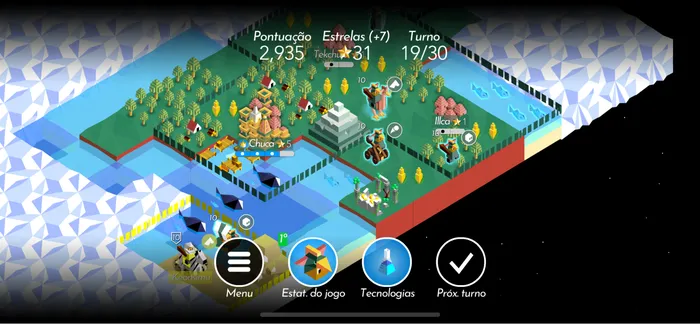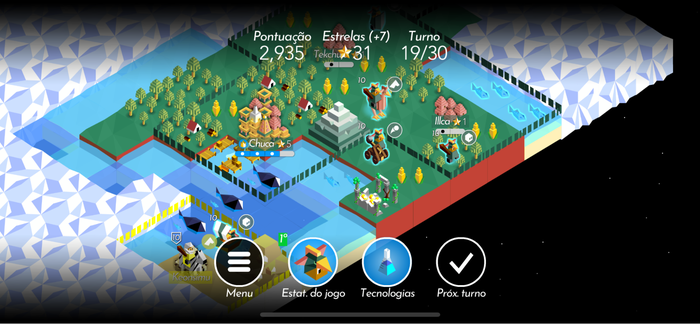
Introduction:
From Ancient Mesopotamia’s Royal Game of Ur to the discovery of 12th-century Icelandic chess pieces, strategic games have – quite literally – stood the test of time. It’s a genre that continues to resonate with all generations of gamers in traditional tabletop form as well as newer, digitized formats. 1988’s Battle Chess brought the title to retro consoles of old, whilst new titles such as ‘Shotgun King: The Final Checkmate’ have found ways to be more playful with the chess formula.
The influence of historical strategy games doesn’t end there. 4x strategy series and titles such as Civilization and Stellaris also take inspiration from the ancient masters, adding new concepts and selling millions of copies in the process. Our own turn-based title The Battle of Polytopia has been installed more than 20 million times.
The influence of chess, in particular, can’t be underestimated. Chess is so ingrained into strategic game design that it’s basically impossible to make a strategy game without gameplay mechanics taking direct or indirect inspiration from the ancient game. And when our community (and a certain billionaire) started to make comparisons between Polytopia and chess, we decided to dig a little deeper into the similarities and differences between The Battle of Polytopia and chess to understand how it has proved a winning design strategy.

Making Connections:
To see how chess compares, let’s start by recapping what the age-old game involves. The core components are deceptively simple: an isometric board, units with defined movement and attack capabilities, and an objective to destroy the opposition. Sound familiar? You’ve likely encountered these same descriptions across other turn-based strategy games you’ve played.
In the case of The Battle of Polytopia, we have an isometric world, individual units with their own characteristics, and a goal to conquer the board. Loved for thousands of years, it’s no wonder why these core concepts are ingrained in strategic design. Like the Victorians and Roman emperors who played chess before us, there’s an age-old love of predicting and responding to the strategic choices of the opposition.
The question for strategic game makers therefore isn’t how do modern games compare to chess, but what can we do to provide a twist on the core design? Random generation is one example. For The Battle of Polytopia, we retain the isometric board yet throw in oceans, mountains, and fields of cherry blossom to navigate; a bit more varied than 64 blank spaces on a chess board!
The Battle of Polytopia also holds more secrets between players. In chess, all the pieces are laid out on the table yet Polytopia’s use of tech trees means that you can’t fully predict the arsenal at the enemy’s disposal. Naval combat is also highly unlikely in chess – unless the match is between pirates – but in Polytopia, the option is there. Innovation in 4X Strategy design can be seen throughout the genre in upcoming games such as Ara: History Untold which revealed crafting mechanics in the latest Xbox Developer Direct.
Embracing the conversation:
We’ve found that players are keen to make comparisons between The Battle of Polytopia and chess, and it’s a discussion we’ve embraced. Search ‘Polytopia’ and ‘chess’ and you’ll find forum posts, Reddit conversations, and Elon Musk making comparisons between the games. For an indie studio such as ourselves, organic discussions like this are hugely valuable, and provide us with a unique opportunity to continue the conversation.
As for how we responded? We became proud sponsors of the National Swedish Chess Team. What better way to respond to the comparisons than to show how both games can exist together! Recently, the five-member national team headed into the European Championship displaying The Battle of Polytopia logo on their uniforms. National sport team sponsorship might not be in every game maker’s marketing plans but for us, it was a unique opportunity to reach a strategic-minded audience. National player and YouTuber Anna Cramling shared this about the sponsorship:
“It was fantastic to see such a wide variety of chess fans cheering the Swedish team on as I shared updates with my YouTube community. I’m grateful for the support Midjiwan provided our team as we competed and am glad we could sport The Battle of Polytopia during the tournament.”
.png?width=700&auto=webp&quality=80&disable=upscale)
Conclusion:
Trying to rival chess is futile – there are more possible variations of chess games than there are atoms in the observable universe. However, when designing strategy games, don’t be afraid to lean on its tried-and-tested mechanics, there’s a reason why chess has become so universally loved! Also, continue to pay attention to feedback from players. Closely monitoring chat about your game will unlock new ways to engage with your audience.






